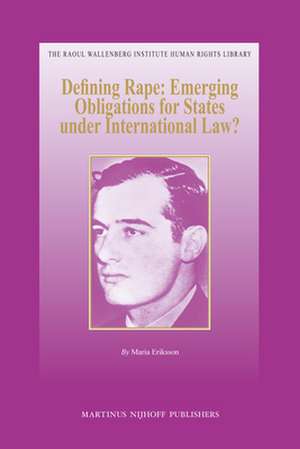Defining Rape: Emerging Obligations for States under International Law?: The Raoul Wallenberg Institute Human Rights Library, cartea 38
Autor Maria Erikssonen Limba Engleză Hardback – 27 oct 2011
Din seria The Raoul Wallenberg Institute Human Rights Library
- 18%
 Preț: 1224.66 lei
Preț: 1224.66 lei - 18%
 Preț: 794.67 lei
Preț: 794.67 lei - 18%
 Preț: 664.02 lei
Preț: 664.02 lei - 18%
 Preț: 1668.25 lei
Preț: 1668.25 lei - 15%
 Preț: 422.68 lei
Preț: 422.68 lei - 18%
 Preț: 1240.22 lei
Preț: 1240.22 lei - 18%
 Preț: 1454.21 lei
Preț: 1454.21 lei - 18%
 Preț: 1622.90 lei
Preț: 1622.90 lei - 18%
 Preț: 1076.02 lei
Preț: 1076.02 lei - 18%
 Preț: 1616.31 lei
Preț: 1616.31 lei - 18%
 Preț: 1557.15 lei
Preț: 1557.15 lei - 18%
 Preț: 1498.19 lei
Preț: 1498.19 lei - 18%
 Preț: 1522.23 lei
Preț: 1522.23 lei - 18%
 Preț: 1214.54 lei
Preț: 1214.54 lei - 18%
 Preț: 1137.87 lei
Preț: 1137.87 lei - 18%
 Preț: 1535.04 lei
Preț: 1535.04 lei - 18%
 Preț: 1471.49 lei
Preț: 1471.49 lei - 18%
 Preț: 1041.93 lei
Preț: 1041.93 lei - 18%
 Preț: 918.48 lei
Preț: 918.48 lei - 18%
 Preț: 1580.05 lei
Preț: 1580.05 lei - 18%
 Preț: 1896.41 lei
Preț: 1896.41 lei - 18%
 Preț: 1030.41 lei
Preț: 1030.41 lei - 18%
 Preț: 1621.62 lei
Preț: 1621.62 lei - 18%
 Preț: 1322.66 lei
Preț: 1322.66 lei - 18%
 Preț: 1475.26 lei
Preț: 1475.26 lei - 18%
 Preț: 1335.77 lei
Preț: 1335.77 lei - 18%
 Preț: 1235.81 lei
Preț: 1235.81 lei - 18%
 Preț: 1110.69 lei
Preț: 1110.69 lei - 18%
 Preț: 1203.25 lei
Preț: 1203.25 lei - 18%
 Preț: 1510.40 lei
Preț: 1510.40 lei - 18%
 Preț: 1461.32 lei
Preț: 1461.32 lei - 18%
 Preț: 1259.44 lei
Preț: 1259.44 lei - 18%
 Preț: 936.17 lei
Preț: 936.17 lei - 18%
 Preț: 1388.38 lei
Preț: 1388.38 lei - 18%
 Preț: 1318.00 lei
Preț: 1318.00 lei - 18%
 Preț: 1357.27 lei
Preț: 1357.27 lei - 18%
 Preț: 1166.96 lei
Preț: 1166.96 lei - 18%
 Preț: 855.94 lei
Preț: 855.94 lei - 18%
 Preț: 1084.50 lei
Preț: 1084.50 lei - 18%
 Preț: 1507.82 lei
Preț: 1507.82 lei
Preț: 1400.21 lei
Preț vechi: 1707.56 lei
-18% Nou
Puncte Express: 2100
Preț estimativ în valută:
267.93€ • 279.19$ • 221.85£
267.93€ • 279.19$ • 221.85£
Carte indisponibilă temporar
Doresc să fiu notificat când acest titlu va fi disponibil:
Se trimite...
Preluare comenzi: 021 569.72.76
Specificații
ISBN-13: 9789004202634
ISBN-10: 9004202633
Pagini: 614
Dimensiuni: 160 x 240 mm
Greutate: 0 kg
Editura: Brill
Colecția Brill | Nijhoff
Seria The Raoul Wallenberg Institute Human Rights Library
ISBN-10: 9004202633
Pagini: 614
Dimensiuni: 160 x 240 mm
Greutate: 0 kg
Editura: Brill
Colecția Brill | Nijhoff
Seria The Raoul Wallenberg Institute Human Rights Library
Cuprins
Excerpt of table of contents:
Part I: Introduction
1 The Definition of Rape in an International Perspective;
Part II: Elements of the Crime of Rape: A Contextual Approach
2 The Prohibition of Rape in Domestic Criminal Law: An Historical Overview; 3 The Harm of Sexual Violence; 4 Elements of the Crime of Rape; 5 Sexual Violence in Context;
Part III: An International Human Rights Law Perspective
6 State Obligations to Prevent and Punish Rape; 7 The Recognition of Rape as a Violation of International Human Rights Law;
Part IV: An International Humanitarian Law and International Criminal Law Perspective
8 International Humanitarian Law; 9 International Criminal Law;
Part V: The Prohibition of Rape – Closing the Gap between International Human Rights Law and International Humanitarian Law?
10 The Interplay between International Human Rights Law and International Humanitarian Law;
Part VI: A Cultural Perspective
11 Cultural Relativism and Obstacles to a Uniform International Definition of Rape;
Part VII: Conclusions – Emerging Obligations in Defining the Crime of Rape?
12 Concluding Summary and Remarks;
References; Bibliography; Index.
Part I: Introduction
1 The Definition of Rape in an International Perspective;
Part II: Elements of the Crime of Rape: A Contextual Approach
2 The Prohibition of Rape in Domestic Criminal Law: An Historical Overview; 3 The Harm of Sexual Violence; 4 Elements of the Crime of Rape; 5 Sexual Violence in Context;
Part III: An International Human Rights Law Perspective
6 State Obligations to Prevent and Punish Rape; 7 The Recognition of Rape as a Violation of International Human Rights Law;
Part IV: An International Humanitarian Law and International Criminal Law Perspective
8 International Humanitarian Law; 9 International Criminal Law;
Part V: The Prohibition of Rape – Closing the Gap between International Human Rights Law and International Humanitarian Law?
10 The Interplay between International Human Rights Law and International Humanitarian Law;
Part VI: A Cultural Perspective
11 Cultural Relativism and Obstacles to a Uniform International Definition of Rape;
Part VII: Conclusions – Emerging Obligations in Defining the Crime of Rape?
12 Concluding Summary and Remarks;
References; Bibliography; Index.
Notă biografică
Maria Eriksson has, after finishing a degree in law at Uppsala University, researched and taught mainly international human rights law and international criminal law at Örebro University as well as worked as a clerk at the International Criminal Court, The Hague.
